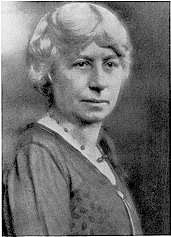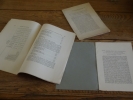Featured: A Celebration of Margaret Floy Washburn ’81 at Vassar and Beyond

Today Psychology is one of Vassar’s most popular majors. “The Intro to Psychology: A Survey” classes are the some of the first to fill up during pre-registration as students seek to understand the way their minds work. The strength and success of the Psychology Department is due to the hard work of many professors over the past 100 years. Margaret Floy Washburn, Vassar graduate of 1881 and professor for over 30 years, is one of the most prominent.
Margaret Floy Washburn was born July 25, 1871 in New York City, NY. She graduated from Vassar in 1881 and attempted to get her Master’s degree from Columbia. Because Columbia didn’t accept women she instead attended Cornell. There she studied under the tutelage of E.B. Tichener, becoming the first woman to receive her Ph.D in 1894.
Before returning to Vassar Washburn served as the Chair of Psychology, Philosophy and Ethics at Wells College in Aurora, NY and then later as an Assistant professor of at the University of Cincinnati. Washburn returned to Vassar to 1903, this time as a teacher, the same year she was on Cotrell’s list of one thousand most important “American Men of Science.” She was one of three women to be included. In her early years at Vassar, she taught in the Philosophy Department. Washburn became an official professor of 1908. That same year she published her first book “The Animal Mind,” which has been translated into multiple languages. Washburn later founded Vassar’s Psychology Department in 1911.
Her accolades extend far beyond the hallowed green of Raymond Avenue. She was the second president of the American Psychology Association and published 69 publications, many of them with Vassar students and alums, in a variety of journals from “The American Journal of Psychology” to the “Journal of Comparative Psychology and Neurology.” Washburn was the second woman to serve as president of the America Psychological Association. She retired from Vassar in 1937 and died October 29, 1939 in Poughkeepsie.
Washburn was not only an inspiration as a published psychologist and leader of women, but also as a mentor. She spoke highly of her colleagues, while bearing the majority of weight of the department. In her department report of the 1911 to 1912 school year, she wrote about one of her colleagues.
To my deep regret, Miss Abbott leaves us to accept a fellowship in the University of Chicago, which is offered to her under very flattering conditions. The head of the department there has made special efforts to increase the financial value of the fellowship, and tells us that the department has never before given a fellowship to a person who has done no work at the Chicago University. It would be impossible for anyone to give more efficient and devoted service than Miss Abbott has given during her stay here of two years and a half, or to be personally more acceptable.
The Psychology department was housed in the Vassar Brother’s Laboratory building, constructed in 1879. She writes, in her Annual Report from 1913-1914:
The stairs are exhausting to climb, the floors are uneven, there are frequent leakages of gas, and the noise from the radiators, which would seem to date from the erection of the building in 1879, is almost continuous and very disturbing when the steam is turned on. It is not necessary to dwell upon this matter, however, as the state of affairs is well known to everyone concerned.
We also much need to strengthen our teaching staff and divide the responsibility of teaching, which rests too heavily upon me. I have already written, of the difficulty of finding suitable candidates for instructors’ positions.
During Washburn’s tenure, the sciences were not the college’s highest priority. In an article written about Washburn for VCencyclopedia highlights Washburn’s dissatisfaction with the Blodgett Hall of Euthenics.
In 1937 she started a faculty outcry on the Vassar campus opposing the demolition of Vassar Brothers Laboratory, where she had established her early Psychology Lab. President MacCracken had decreed that the building was unfit. Washburn opposed the move because it would cause the department to be housed in Blodgett Hall of Euthenics, which had then just recently been built. As usual, her opposition was on principle, as she thought the discipline of euthenics would return women to the kitchen, from which they had been emancipated by Matthew Vassar.
An Example of Washburn’s Exemplary Research
Ms. Washburn’s research and teaching reflect a rich multidisciplinary approach. Even as early as 1911, she taught her students to examine the psychology of defective children, of psychotherapy, of testimony, and also the psychology of advertising in the variety of classes she taught. Her studies had titles such as “The Affective Values of Articulate Sounds,” or “Questionary Study of Certain National Differences in Emotional Traits.” In the latter, Washburn analyzed the various emotional responses of people from different countries. The study appeared in “The Journal of Comparative Psychology” in December, 1923. Here are some of her conclusions.
Our results show a few fairly well-marked differences between the national groups who answered the questionary. These differences may be interpreted under the following heads:
- 1. Differences due to differences in native intellectual ability. The act that the Russian Jewish women take more pleasure in intellectual activities than do the Southern Italian women may be fairly interpreted in connection with the low Army Test scores made by Southern Italians.
- 2. Differences due to environment and social tradition. The high values placed by the Southern Italians on church-going and by the French girls on the theatre as sources of enjoyment may serve as examples; also the high reaction of fear to “guns” on the part of the Parisian working girls is a reminiscence, probably, of the war. (The translator of the questionary into French rendered this item “le canon,” hence one is not surprised that the Parisians reacted strongly to it.)
- 3. Differences due to differences, probably native, in type of emotional response. Our questionary, dealing not with how one responds but with what occasions the response, was not adapted to bring out such differences: the one which does appear is the relative weakness of the Russian Jewish groups, especially when compared with the Southern Italians, in the reaction of altruistic anger.
Margaret Floy Washburn had a lasting effect on the scientific study of Psychology. From her leadership in the classroom to her influence in the advancement of the field of Psychology, she inspired generations of young women scientists, especially the lucky students that studied with her at Vassar.
Sources
-Reprints of Margaret Floy Washburn articles provided by Dr. Janet Gray, Professor of Psychology at Vassar College
-Conversation with Vassar Professor Dr. Janet Gray
-VCencyclopedia article on Margaret Floy Washburn (photo taken from website)
http://vcencyclopedia.vassar.edu/faculty/prominent-faculty/margaret-floy-washburn.html

